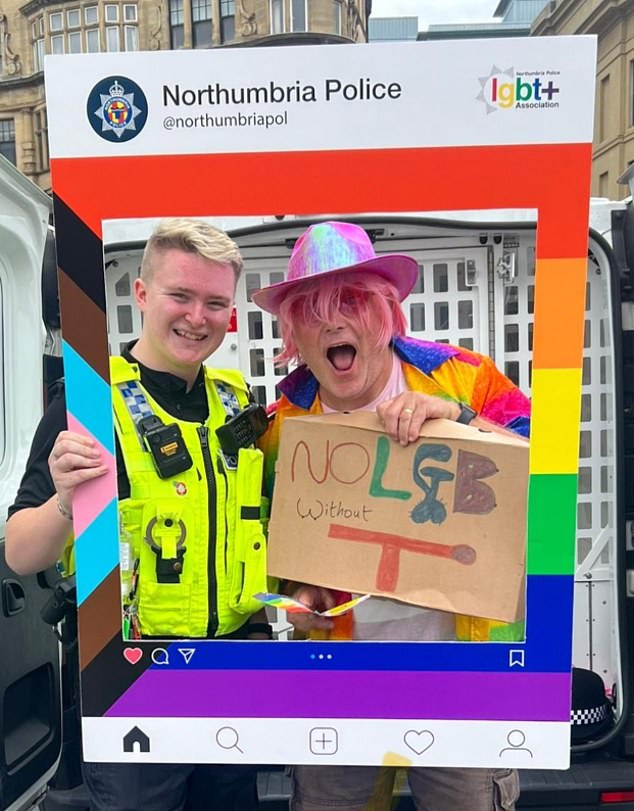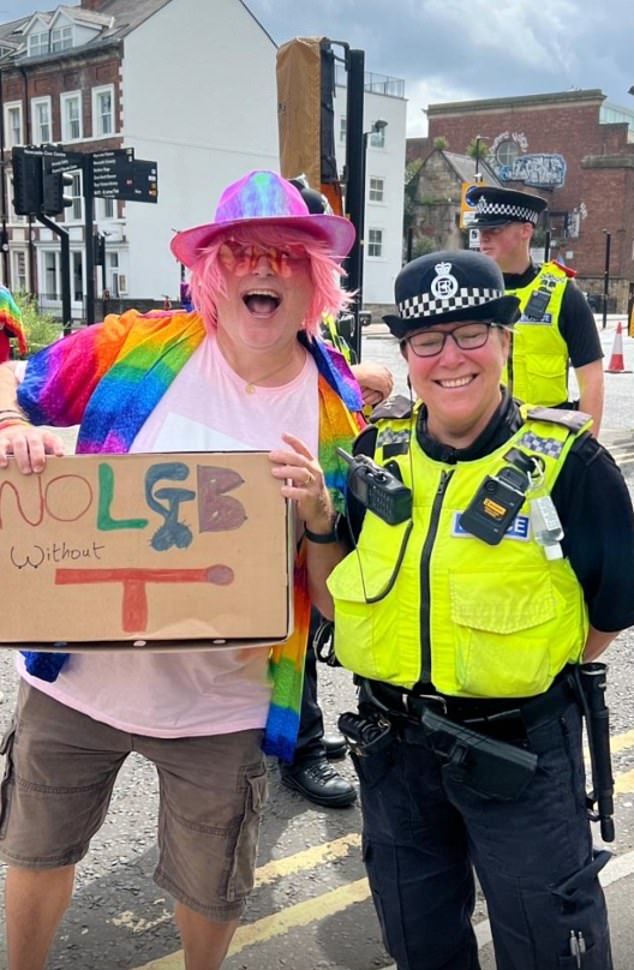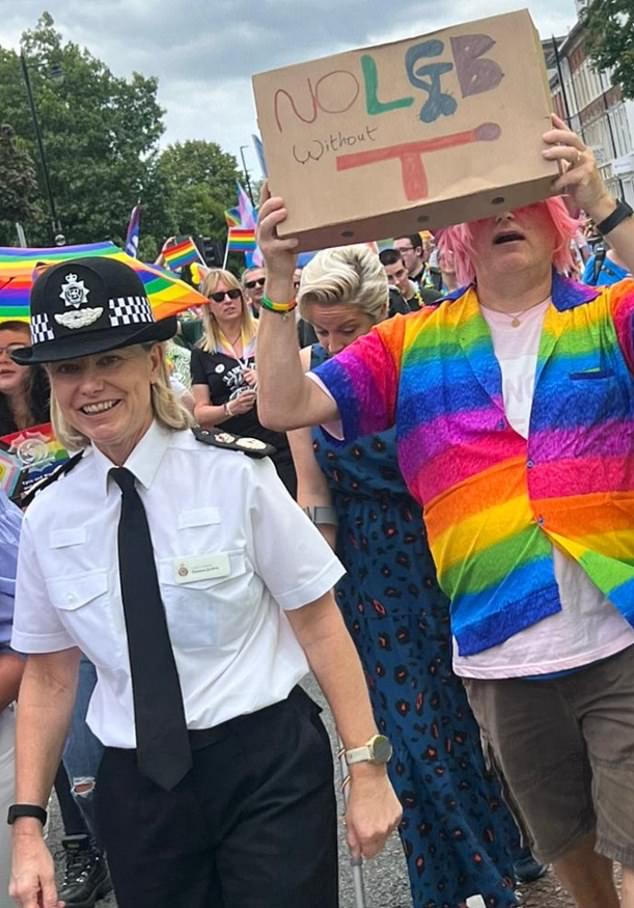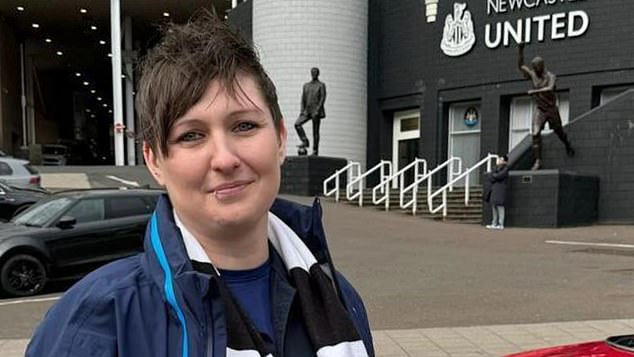Police officers face being banned from participating in Pride parades after a court ruled that one of Britain’s largest forces breached impartiality by marching at an LGBT+ rights event.
The Chief Constable of Northumbria Police acted unlawfully when she allowed uniformed officers to march under a transgender flag at a Pride event last year, a judge ruled today.
A judicial review was brought by Lindsay Smith, a gender-critical campaigner, who argued that the force broke the professional oath sworn by police officers to act ‘with impartiality’.
Officers from Northumbria had a stall at last year’s Pride parade in Newcastle, marched under the Progress flag promoting transgender ideology and painted a police van with trans colours.

Officers from Northumbria had a stall at last year’s Pride parade in Newcastle, marched under the Progress flag promoting transgender ideology and painted a police van with trans colours

A judicial review was brought by Lindsay Smith, a gender-critical campaigner, who argued that the force broke the professional oath sworn by police officers to act ‘with impartiality’

In his ruling at the High Court in Leeds, Mr Justice Linden agreed and said it was ‘contrary to the uniformed officers’ duties of impartiality’, as well as the chief constable Vanessa Jardine’s ‘own duty of impartiality, to participate in the 2024 march in the way that they did’
Ms Smith, a lesbian who participated in the event, asked the court to find that ‘the above activities of the Force during Newcastle Pride in the City 2024, and the decision of the Chief Constable that officers could or should participate in such activities, were unlawful’.
In his ruling at the High Court in Leeds today, Mr Justice Linden agreed and said it was ‘contrary to the uniformed officers’ duties of impartiality’, as well as the chief constable Vanessa Jardine’s ‘own duty of impartiality, to participate in the 2024 march in the way that they did’.
The judgment states: ‘If one then asks whether the officers’ activity of taking part in the March was likely to give rise to the impression amongst members of the public that it may interfere with their ability to discharge their duties impartially… the answer seems to me clearly to be “yes”.
‘Moreover, the fact that they wore their uniforms, marched as a contingent, and carried the Police Pride and other flags demonstrated their support for the cause as police officers.’
Mr Justice Linden added that this could suggest the force’s ‘institutional support for gender ideology and transgender rights’ and warned that this could be seen by the public as the force ‘taking sides’ in the women’s rights debate.

Lindsay Smith (pictured) said she was ‘delighted’ with the ruling as it would be ‘terrifying to live in a community where the police have abandoned their duty of impartiality and embraced a highly controversial political cause’
Ms Smith said she was ‘delighted’ with the ruling as it would be ‘terrifying to live in a community where the police have abandoned their duty of impartiality and embraced a highly controversial political cause’.
She added: ‘My hope is that Northumbria Police change their ways and follow this ruling. If they do they will be policing the community for everyone.’
The ruling only relates to the Pride event in 2024 but Mr Justice Linden said that it is for Northumbria’s Chief Constable to decide on the force’s approach to this year’s event ‘in the light of what I have said in this judgment’.
According to lawyers for Ms Smith, the ruling will raise questions over the participation of police forces in all Pride events – including Northumbria Police’s role in Newcastle Pride 2025 which is scheduled to take place this weekend.
Paul Conrathe, Ms Smith’s solicitor, said that the ruling was of ‘national importance’ as ‘British police must be above the fray and avoid taking sides on contested issues’.
He added: ‘This judgement should give Chief Constables and officers around the country serious pause for thought. They wield the power of the State and should not be seen to associate with controversial political causes. If they do they will be breaking the law.’
A Northumbria Police spokesman said that its ‘primary aim’ during last year’s march was ‘to keep people safe’ but that the event also provided the force ‘with an opportunity to engage with people including those who may have less confidence in policing.’
The force did not say whether it would take part in this weekend’s Newcastle Pride parade but added: ‘We will work through the ruling to understand the implications, while staying true to our values of fairness, visibility, and support for all.’
Chief Constable Gavin Stephens, chair of the National Police Chiefs’ Council, said: ‘We are working through the detail of this judgment and will ensure this decision is communicated to forces for them to consider.
‘We are also working with the College of Policing on broader guidance which will help local forces make decisions around participation in events to maintain their impartiality.’












